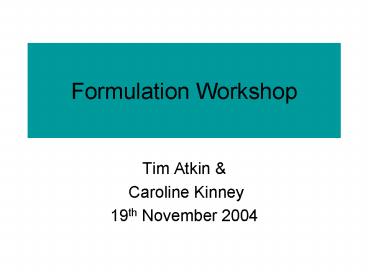Formulation Workshop - PowerPoint PPT Presentation
1 / 12
Title:
Formulation Workshop
Description:
after Carr (1999) Formulations : A Framework. Precipitating Factors. Predisposing Factors ... Formulations : A Systemic Framework (see Carr, 2000) Influential Contexts ... – PowerPoint PPT presentation
Number of Views:36
Avg rating:3.0/5.0
Title: Formulation Workshop
1
Formulation Workshop
- Tim Atkin
- Caroline Kinney
- 19th November 2004
2
Simple Model of Clinical Psychology Practice
Assessment
Formulation
Intervention
Evaluation
3
Complex Model of Clinical Psychology Practice !!
InitialAssessment
Critical Review
Outcome
Hypothesising
Action Plan
Intervention Goals, Methods etc.
Hypothesis testing
FORMULATION REFORMULATION
Reflexive Evaluation
4
Formulations
- Offer coherent psychological explanations of the
presenting difficulties - Place these difficulties in multiple contexts
- Draw upon psychological theory and evidence
- Are designed to be used to plan appropriate
interventions - Should be developed and shared with clients where
possible
5
Formulations are not.
- Simply lists of different factors involved.
- Meant to apportion blame to any family, person or
set of people. - Final
- Pronouncements to be hidden from the client(s)
- Diagnoses (see next 2 slides)
6
Diagnosis (vs Formulation) 1
- Current systems ICD 10 DSM IV
- Multiaxial classification
- Axis 1 Clinical Psychiatric Syndrome
- Axis 2 Specific Delays in Development
- Axis 3 Intellectual Level
- Axis 4 Medical Conditions
- Axis 5 Abnormal Social Situations
7
Diagnosis (vs Formulation) 2
- Useful communication but diagnosis conveys
limited understanding of individual complexities - Diagnoses can often be powerful in accessing
further services/ support - Not take into account heterogeneous nature of
problems - Once made, can be difficult to question/ adapt/
review - Individual case formulation can supplement
diagnosis
8
Formulations A Framework
Precipitating Factors
Predisposing Factors
The problem as explained by these factors
Suggested Action Plan
Maintaining factors
Protective Factors
9
Formulations A Systemic Framework (see Carr,
2000)
Influential Contexts
Belief systems associated with the problem
Behaviour Patterns associated with the problem
A Shared Understanding of the Problem
Untapped Resources, Exceptions Subjugated
Stories
A Shared Understanding of a Way forward
10
Engagement Collaboration
- Clinical Experience
- Ethics
- Evidence
- Influential Ideas
11
Possible Pitfalls
- Oversimplification of a complex problem
- May be unintentionally perceived as blaming
- May be presented as the truth
- Clinician perceived as the expert with all the
answers - Increase hopelessness
12
Formulation Feedback
- simple jargon-free language (e.g. the clients)
- present as ideas rather than the truth
- respectful non-blaming
- encourage feedback
- draw it / write it down
- focus on key areas of change
- think about timing































